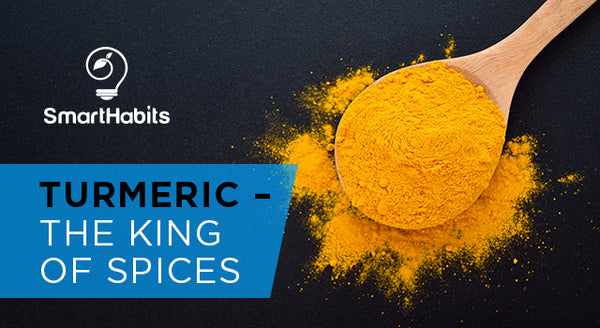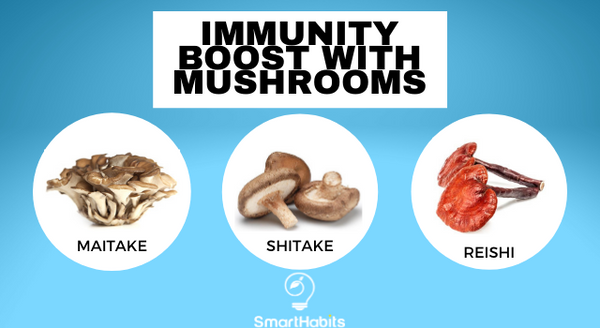Smart Habits for Brain Health, Memory, & Focus: Part II
As our lifespans increase, it is important to shift our focus from not only living longer but maintaining the quality of life in later years. In our previous blog, we discussed the topic of smart habits for optimizing memory, focus, and support overall brain health. This topic is important as cognitive decline is on the rise in the USA and an estimated 3.4 million people in the USA are affected by dementia. Dementia and memory loss are most commonly seen in the elderly and the elderly population is expected to double by the year 2030 (6). The younger population of students and those with mentally demanding jobs are also seeking support to improve concentration, memory, and mental performance.
In this blog, we continue our discussion of smart habits for brain health, which include herbs and nutritional supplements which have the ability to improve memory and focus, as well as protect the brain from age-related cognitive decline and keep the mind sharp. These supplements are referred to as nootropics.
Nootropics
Nootropics are also referred to as cognitive enhancers, which improve memory, creativity, motivation and overall cognitive functioning. They work through several mechanisms, such as protecting the brain from oxidation and degeneration, increasing blood flow and oxygenation to the brain, and modulating signaling and neurotransmitter in the brain (6). Today many people are incorporating nootropics into their health and wellness routine. Below we discuss our favorite techniques and nootropics for boosting brain health.
Oxidative Stress
Oxidative stress in the brain is a term used to describe damage to neurons and brain structures by reactions which produce reactive chemicals. This occurs when the natural metabolism of the brain outpaces the amount of antioxidants available. We know that oxidative stress is one of the major factors in the development of the majority of brain diseases such as dementia, Alzheimer’s, depression, and memory loss (6). In part I of this blog, we touched on dietary strategies to raise antioxidant levels. There are several herbs with are particularly effective for combating inflammation in the brain.
Bacopa
Bacopa is an Ayurvedic herb with a long history of use in India for supporting memory and cognitive function. In studies, Bacopa is shown to decreases forgetfulness. Its effects are through a number of mechanisms which include antioxidant activity, increasing blood flow to the brain, and modulating neurotransmitters such as dopamine and acetylcholine - two neurotransmitters involved in memory. (1,6).
Bacopa contains a number of constituents, including bacosides which repair neurons and protect against oxidative damage (6). Bacopa works synergistically with other herbs, which influence similar aspects of cognition and therefore is often paired with complementary herbs for added benefit.
Curcumin
Curcumin is an herb and culinary spice with a powerful ability to protect the brain as well as support the health of neurons. It is commonly found in Indian foods, such as curries. It has been shown in research to have the ability to cross the blood–brain barrier and work directly in the brain as an antioxidant, protecting the brain from oxidative damage as well as reverse stress-related damage to areas such as the hippocampus - the area responsible for memories. In addition, curcumin increases brain derived growth factor (BDGF), which is a signaling molecule the brain uses to support the production and health of brain cells (6). Curcumin is an excellent preventive herb for overall brain health and shows great potential as an integrative approach to neuro-degenerative disease such as dementia.
Resveratrol
Resveratrol is found the dark purple/red pigments of grapes and is a potent antioxidant. It is has been used to protect neurons against damage caused by oxidative stress and research has shown it is useful in helping to clear amyloid peptides which are seen in Alzheimer’s (6). Resveratrol can be found as a nootropic ingredient in brain supplements, as well as in red wine.
Increased Blood Flow
Increasing blood flow to the brain is another strategy for improving brain health, memory and focus. Increasing blood flow to the brain increases the amount of oxygen that the brain has access to, as well as helps to eliminate free radicals (6).
Exercise is a strategy to encourage brain blood flow we touched on in part I of this blog. There are specific herbs which are able to increase blood flow to the brain including one of the most common herbs associated with brain health - Ginkgo Biloba.
Gingko Biloba
Gingko Biloba is a nootropic herb which has been used for improving blood flow to the brain and increasing oxygenation through its constituents: Bilobalide and ginkgolides. In addition, these constituents increase GABA, a calming neurotransmitter in the brain, which assists with stress and anxiety reduction (6). Gingko is often used in both the younger, student populations to aid in studying and mental performance, as well as the older population to promote memory retention.
Increasing Acetylcholine
Acetylcholine is a neurotransmitter found in the brain which is involved in the creation of memories. This neurotransmitter has been associated with many causes of cognitive decline including certain kinds of dementia. There are herbs which inhibit the enzyme acetylcholinesterase, which prevents the breakdown of acetylcholine and can therefore support memory.
Huperzine
Huperzine is derived from the herb Huperzia serrata, and is a potent selective inhibitor of acetylcholinesterase. Numerous research studies have demonstrated huperzine’s effectiveness in increasing cognitive function, memory, and mental clarity (13). Huperzine is commonly included in brain-boosting supplements as it can assist memory and information retention in both the younger and older populations.
Rhodiola
Rhodiola is an herb with historical use of improving mood, concentration, and memory. Evidence supports its ability to inhibit acetylcholinesterase, which explains its effect on memory retention (3). This herb is popular among people who wish to improve their work performance as well as combat physical and mental fatigue. It also has been shown to help mitigate physical and physiological stress, which are two factors that impair mental performance (5). Rhodiola is classically recommended for the over-worked, burnt out student or employee, suffering from brain fog, fatigue and decreased mood.
Summary
Supplementation with nootropics are becoming more popular in the student population as well as the aging population. They are an effective addition to aid in focus, cognition and optimal brain function. The herbs and nutrients often work synergistically, and a combination of several may yield the most effective results. It is important to remember that a healthy lifestyle and diet is foundational to health - including brain health, and no amount of supplementation can undo lack of sleep, a sedentary lifestyle, or unhealthy eating habits. It is key, to begin with these foundations of health and wellness which we discuss in part I of this blog.
REFERENCES
- Aguiar, S., & Borowski, T. (2013). Neuropharmacological review of the nootropic herb Bacopa monnieri. Rejuvenation research, 16(4), 313-326.
- Grayson-Mathis, C. (2005, April 1) 20 Common Foods With the Most Antioxidants. Retrieved from WebMD website: https://www.webmd.com/food-recipes/20-common-foods-most-antioxidants
- Hillhouse, B., Ming, D. S., French, C., & Towers, G. H. (2004). Acetylcholine esterase inhibitors in Rhodiola rosea. Pharmaceutical Biology, 42(1), 68-72.
- Julson, E, (2018, October 5), 16 Foods That Are High In Niacin. Retrieved From: https://www.healthline.com/nutrition/foods-high-in-niacin
- Khanum, F., Bawa, A. S., & Singh, B. (2005). Rhodiola rosea: a versatile adaptogen. Comprehensive reviews in food science and food safety, 4(3), 55-62.
- Kumar, G. P., Anilakumar, K. R., & Naveen, S. (2015). Phytochemicals Having Neuroprotective Properties from Dietary Sources and Medicinal Herbs. Pharmacognosy Journal, 7(1).
- Kvam, S., Kleppe, C. L., Nordhus, I. H., & Hovland, A. (2016). Exercise as a treatment for depression: a meta-analysis. Journal of affective disorders, 202, 67-86.
- Magee, E. (2010) 10 Antioxidant Super Foods Retrieved from WebMD website: https://www.webmd.com/food-recipes/features/10-super-foods#3
- McGarel, C., Pentieva, K., Strain, J. J., & McNulty, H. (2015). Emerging roles for folate and related B-vitamins in brain health across the lifecycle. Proceedings of the Nutrition Society, 74(1), 46-55.
- Prousky, J. (2011). Treating dementia with vitamin B3 and NADH. Journal of Orthomolecular Medicine, 26(4), 163.
- Ristau, S. (2011). People do need people: Social interaction boosts brain health in older age. Generations, 35(2), 70-76.
- Tanaka, H., & Shirakawa, S. (2004). Sleep health, lifestyle and mental health in the Japanese elderly: ensuring sleep to promote a healthy brain and mind. Journal of psychosomatic research, 56(5), 465-477.
- Yang, G., Wang, Y., Tian, J., & Liu, J. P. (2013). Huperzine A for Alzheimer’s disease: a systematic review and meta-analysis of randomized clinical trials. PloS one, 8(9), e74916.
Statements made on this website have not been evaluated by the U.S. Food and Drug Administration. Information provided by this website or this company is not a substitute for direct, individual medical treatment or advice. It is the responsibility of you and your healthcare providers to make all decisions regarding your health. SmartHabits recommends that you consult with your healthcare providers regarding the diagnosis and treatment of any disease or condition. Products sold on this website are not intended to diagnose, treat, cure, or prevent any disease.




